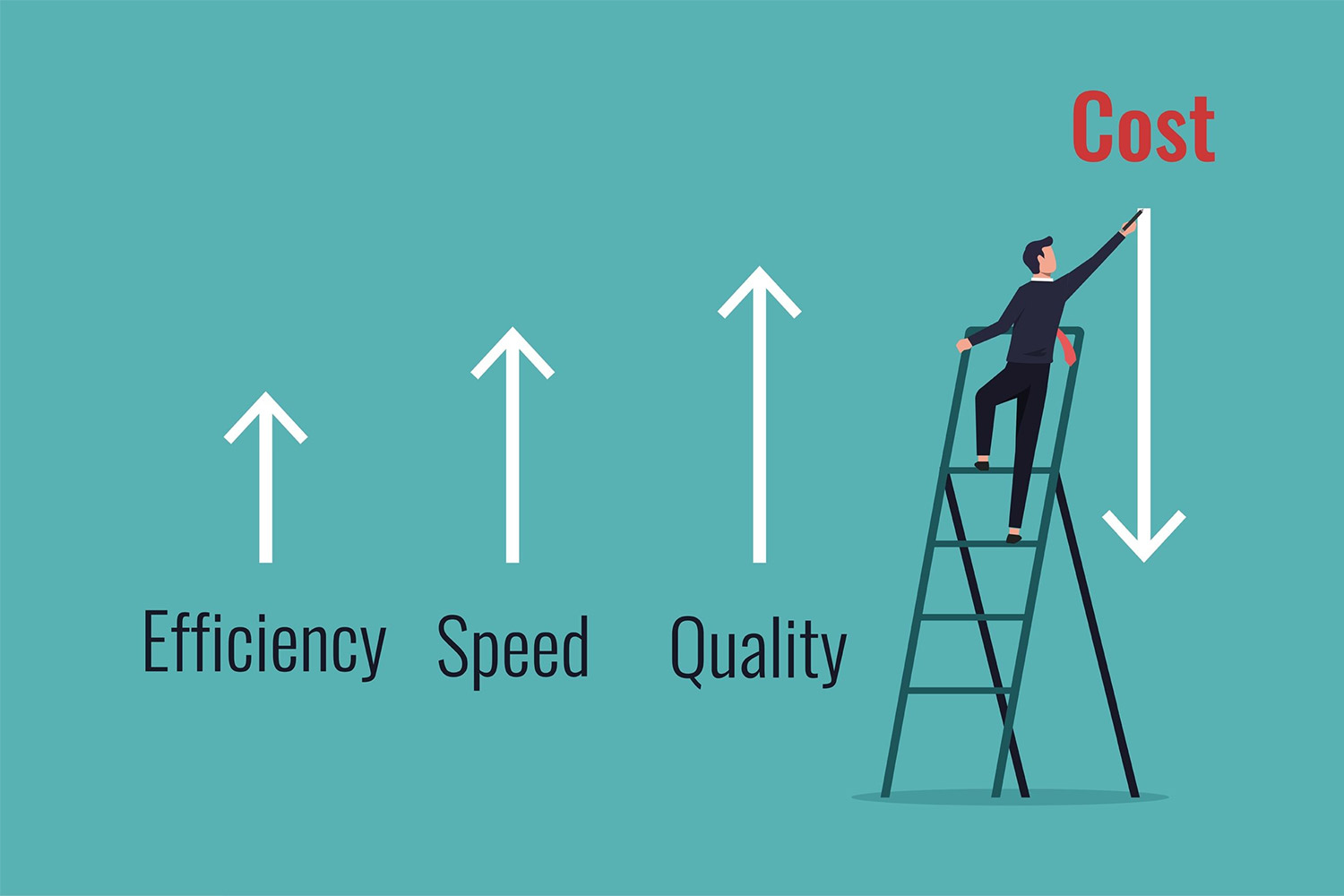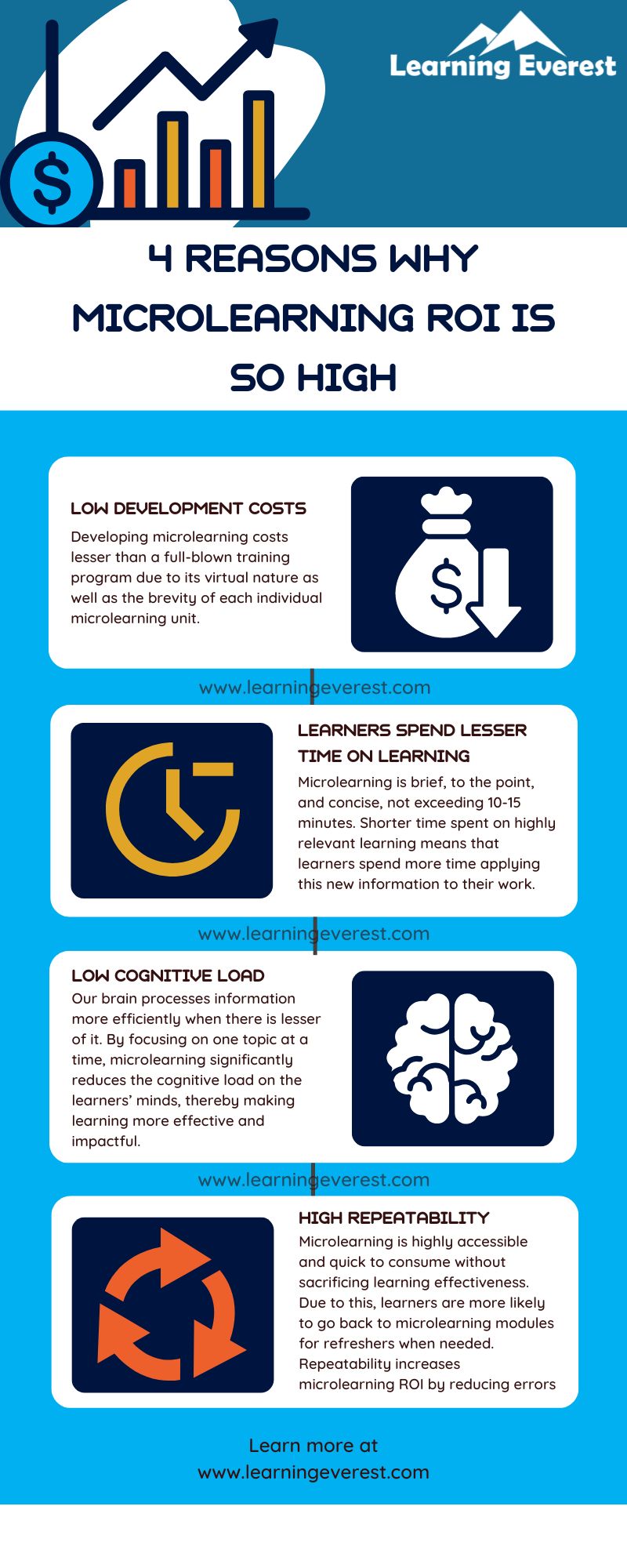Measuring microlearning ROI allows organizations to observe how well their development efforts fare. ROI is a standard metric that businesses use to determine whether their expenditures yield results. With microlearning ROI, they can compare microlearning costs and effectiveness with other training efforts and continually improve the quality of organizational L&D. Fortunately for companies that do opt for microlearning, the results are usually a net gain over past performance. In this article, we will look at 4 reasons why microlearning ROI is one of the highest among all e-learning interventions.
Table of Contents
What is Microlearning?
For those new to the idea, microlearning is a digital training delivery format that offers lessons in focused, bite-sized chunks.
Each microlearning module deals with a single topic and presents the most essential details about the topic. Courses are structured to effectively meet learning objectives and contribute to business goals and the learning is weaved into the flow of work.
Through these core features, microlearning maximizes learner engagement and attention by making the learning process as fluid and light as possible.
Reasons Behind High Microlearning ROI
#1: Microlearning ROI is high because of low development costs
Microlearning costs lesser in comparison to developing a full-blown training program. This is due to their virtual nature as well as the brevity of each individual microlearning unit.
- Virtual learning eliminates the need for an instructor, venue, and additional physical training resources. As long as learners have an internet connection and a compatible device, they can access the course easily. Businesses, thus, save costs on venue, equipment, and planning by opting for microlearning.
- Due to its shorter length, microlearning is quicker to design and develop. The aim is to trim down information to its most necessary bits to make learning impactful. By doing so, the length of each course decreases dramatically.
- Additionally, development assets can be reused for microlearning as businesses typically follow a standardized branding guideline for their e-learning courseware.

4 Important Reasons Why Microlearning ROI is so High
#2: Microlearning ROI is high because learners spend lesser time on learning
It’s in the name. Microlearning is brief, to the point, and concise, not exceeding 10-15 minutes. It is also a form of learning designed to fit into the flow of work.
When these two characteristics are combined, it results in a learning process where highly relevant knowledge and skills are gained in short bursts with a minimal sense of distraction or interruption.
Shorter time spent on highly relevant learning means that learners spend more time applying this new information to their work. When a significant section of the workforce develops in this way, the company’s productivity skyrockets, leading to greater profits, therefore reaping a hefty ROI from microlearning efforts.

4 Important Reasons Why Microlearning ROI is so High
#3: Microlearning ROI is high because of low cognitive load and highly impactful learning
Microlearning is heavily based on psychological learning principles and brain science. One of the main theories that guide it is the cognitive load theory (CLT).
According to CLT, our brain processes information more efficiently when there is lesser of it. This is because our working memory, the part of our cognition involved in active information processing, has a limited capacity. At any given time, the working memory can hold up to 3-5 pieces of information. That is the optimal cognitive load. Any more stimuli lead to cognitive overload and diminish the quality of learning.
By focusing on one topic at a time, microlearning significantly reduces the cognitive load on the learners’ minds, thereby making learning more effective and impactful, making it one of the reasons behind high microlearning ROI.

4 Important Reasons Why Microlearning ROI is so High
#4: Microlearning ROI is high because of high repeatability
Consider this question: would you be more inclined to revise for a quiz using flashcards or would you prefer to directly revise from a textbook? For most of us, the answer would be the former because flashcards are quicker to go through and have more precise information in them.
Microlearning is the same. In fact, microlearning is commonly used to reinforce new or existing knowledge and is also referred to as just-in-time learning. This is because microlearning is highly accessible and quick to consume without sacrificing learning effectiveness. Due to this, learners are more likely to go back to microlearning modules for refreshers when needed.

4 Important Reasons Why Microlearning ROI is so High
This property makes microlearning highly repeatable. This reduces the likelihood of employees avoiding tasks or, worse, “winging” them when they can’t remember certain aspects. When the need arises, learners can go back to microlearning modules for a refresher without interrupting their working hours for too long.
Repeatability increases microlearning ROI by reducing errors and by developing a culture of revision over avoidance or procrastination in your workforce.
Infographic
Conclusion
Microlearning has become a must in every business and institution’s L&D toolbox in the digital age. It provides highly relevant learning at low costs with high returns, making organizations profitable as a whole. The resources saved from microlearning can then be invested in other growth opportunities without compromising on talent development.
Frequently Asked Questions (FAQs)
Is microlearning more effective?
Microlearning has gained popularity due to its effectiveness. Short, focused lessons allow learners to absorb and retain information better, making it a valuable approach for skill development.
Why is microlearning popular?
Each microlearning module deals with a single topic and presents the most essential details about the topic. Courses are structured to effectively meet learning objectives and contribute to business goals, and the learning is weaved into the flow of work.
What are the benefits of microlearning?
Microlearning offers advantages like,
- Improved knowledge retention
- Time-efficient
- Enhanced engagement through multimedia content
- Accessibility on different devices
- Personalized learning paths






